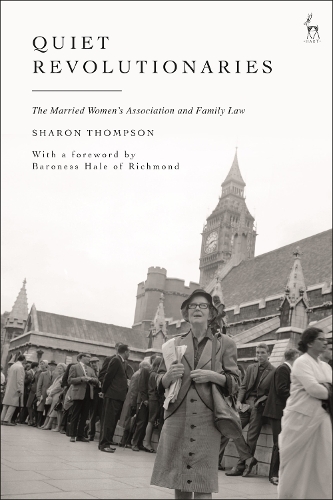
Quiet Revolutionaries: The Married Women's Association and Family Law
(Paperback)
Available Formats
Publishing Details
Quiet Revolutionaries: The Married Women's Association and Family Law
By (Author) Sharon Thompson
Bloomsbury Publishing PLC
Hart Publishing
21st March 2024
United Kingdom
Classifications
Tertiary Education
Non Fiction
Law and society, gender issues
Legal history
346.41015
Physical Properties
Paperback
280
Width 156mm, Height 234mm
Description
This book tells the untold story of the Married Womens Association. Unlike more conventional histories of family law, which focus on legal actors, it highlights the little-known yet indispensable work of a dedicated group of life-long activists. Formed in 1938, the Married Womens Association took reform of family property law as its chief focus. The name is deceptively innocuous, suggesting tea parties and charity fundraisers, but in fact the MWA was often involved in dramatic confrontations with politicians, civil servants, and Law Commissioners. The Association boasted powerful public figures, including MP Edith Summerskill, authors Vera Brittain and Dora Russell, and barrister Helena Normanton. They campaigned on matters that are still being debated in family law today. Quiet Revolutionaries sheds new light upon legal reform then and now by challenging longstanding assumptions, showing that piecemeal legislation can be an effective stepping stone to comprehensive reform and highlighting how unsuccessful bills, though often now forgotten, can still be important triggers for change. Drawing upon interviews with members friends and family, and thousands of archival documents, the book is compulsory reading for lawyers, legal historians, and anyone who wishes to explore histories of law reform from the ground up. Winner of the SLSA Socio-Legal Theory and History Book Prize 2023. To listen to podcast episodes about the Married Womens Association, featuring interviews and archival research, visit quietrevolutionaries.podbean.com.
Reviews
I believe this book to be of central importance to scholars studying the history of women and feminist movements, and family law in the twentieth century. It is so rare for a legal history book to truly convey how and why the law developed in the way it did, and the significance of these developments to the people subject to the legislation. In Quiet Revolutionaries, Sharon Thompson has raised the bar for those of us working in the field. -- Jennifer Aston * Feminist Legal Studies *
Sharon Thompson is to be thanked and congratulated for giving us this detailed and perceptive account of the activities of a previously little-known group of quiet but determined activists A treasure trove, offering newly accessible detail and contributing across so many areas to the understanding of the process of law reform and to the history of feminist thought and strategies for reformers. -- Mavis Maclean * Journal of Law and Society *
Quiet Revolutionaries is a fantastic book that should be read by legal historians, practitioners and anyone interested in how legal change is achieved Drawing upon rich insights from archival and empirical research, this book reveals that the MWAs story is a microcosm of feminist legal activism Quiet Revolutionaries provides a new way of thinking about that activism and how success might be measured for reform projects in family law today. -- Andy Hayward * Financial Remedies Journal *
The book is beautifully written, providing the reader with a real sense of what it was like for women (and men) in previous decades, for Thompson has done her research in archives and from interviews and knows the period thoroughly. What it also offers is a properly accurate and nuanced examination of the law and the proposed reforms that one could only get from an experienced teacher of both family law and property law. Quiet Revolutionaries takes feminist legal history and legal history generally to a new level. -- Rosemary Auchmuty * Frontiers of Socio-Legal Studies *
The influence and importance of the Married Womens Association and its visionary leading lights ... ought to be much better known, not only among family lawyers but also among everyone who is interested in the movement for womens equality. Sharon Thompson has enriched our knowledge and understanding by shining a light upon these quiet revolutionaries. * Brenda Hale, Baroness Hale of Richmond, former President of the Supreme Court of the UK [from the foreword] *
Quiet Revolutionaries brilliantly illustrates the value of taking a feminist approach to legal history. Meticulously researched and engaging, it shines a light on an overlooked but vitally important campaign for substantive equality within marriage and on the challenges of reforming the law. * Rebecca Probert, Professor of Law, University of Exeter, UK *
Economic dependence in marriage was an abiding concern for twentieth-century feminists, but until now we have known too little about how activists used the law as a tool for change. Deeply researched and highly readable, Sharon Thompsons book recovers the dogged campaigning of the Married Womens Association, revealing its steely efforts to reshape norms about gender, power and the value of womens labour in the family. * Helen McCarthy, Professor of Modern and Contemporary British History, University of Cambridge, UK *
Author Bio
Sharon Thompson is Reader in Law at Cardiff University, UK.
